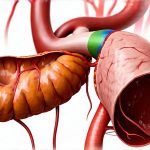Smoking is widely recognized as detrimental to respiratory and cardiovascular health, but its far-reaching effects often extend beyond these systems. Many people are unaware of the significant impact smoking can have on the digestive system, ranging from minor discomfort to serious medical conditions. This article explores the complex relationship between tobacco use and gastrointestinal function, outlining how smoking affects various parts of the digestive tract and contributes to a range of health issues.
Understanding how smoking disrupts normal digestive processes is crucial for anyone concerned about their overall well-being. Beyond the commonly known risks associated with lung cancer and heart disease, recognizing the potential damage to the digestive system can empower individuals to make informed lifestyle choices. This knowledge helps illuminate why quitting smoking isn’t just beneficial for lungs; it’s essential for maintaining a healthy gut and optimizing digestion.
The Digestive System & Smoking: A Broad Overview
The digestive system is responsible for breaking down food, absorbing nutrients, and eliminating waste. It’s a complex process involving multiple organs, including the mouth, esophagus, stomach, intestines, liver, pancreas, and gallbladder. Smoking interferes with nearly every stage of this process, impacting motility, enzyme secretion, blood flow, and even the gut microbiome. The chemicals in tobacco smoke are not simply inhaled; they’re absorbed into the bloodstream and distributed throughout the body, directly affecting digestive organs.
The systemic effects of smoking – inflammation, reduced oxygen delivery, and compromised immune function – all contribute to a weakened digestive system. This makes individuals more susceptible to developing various gastrointestinal disorders and increases the severity of existing conditions.
Specific Areas Affected by Smoking
Smoking impacts the entire digestive tract, but certain areas are particularly vulnerable. The mouth and esophagus bear the brunt of direct exposure through smoke inhalation, while the stomach and intestines suffer from systemic effects and altered blood flow. The liver and pancreas also experience significant disruption due to smoking’s impact on metabolic processes and inflammation. Ultimately, these disruptions can lead to a cascade of digestive problems.
Impact on the Mouth & Esophagus
The mouth is the first point of contact with smoke, leading to immediate irritation and increased risk of oral cancers. Beyond cancer, smoking reduces saliva production, which aids in food breakdown and protects against tooth decay. This dry mouth makes chewing and swallowing difficult, potentially contributing to indigestion. The esophagus also suffers from direct exposure, increasing the risk of esophageal reflux (heartburn) and esophageal cancer. Smoking weakens the lower esophageal sphincter, allowing stomach acid to flow back up into the esophagus more frequently.
Smoking further exacerbates conditions like gastroesophageal reflux disease (GERD), leading to chronic inflammation and damage to the esophageal lining. This can result in Barrett’s esophagus, a precursor to esophageal adenocarcinoma. The constant irritation also impacts taste buds, altering perceptions of flavor and potentially leading to poor dietary choices.
Effects on Stomach & Intestines
The stomach’s ability to effectively digest food is compromised by smoking. It impairs gastric emptying – the rate at which food moves from the stomach to the small intestine – often leading to bloating, nausea, and discomfort. Smoking also increases stomach acid production, potentially contributing to peptic ulcers and exacerbating existing ulcer symptoms. The intestines are affected both directly through chemical exposure via absorption and indirectly through reduced blood flow.
Reduced blood flow to the intestines compromises nutrient absorption and can contribute to inflammatory bowel disease (IBD), including Crohn’s disease and ulcerative colitis. Smoking is a well-established risk factor for developing IBD and increases its severity in those already diagnosed. It also alters the gut microbiome, disrupting the delicate balance of bacteria crucial for healthy digestion.
Pancreas & Liver Complications
The pancreas plays a vital role in digestion by producing enzymes that break down fats, proteins, and carbohydrates. Smoking damages pancreatic cells, increasing the risk of pancreatitis – inflammation of the pancreas. Chronic pancreatitis can lead to malabsorption of nutrients and diabetes. The liver is responsible for filtering toxins from the body, and smoking significantly burdens this organ.
Tobacco smoke contains numerous toxic chemicals that the liver must process, leading to oxidative stress and cellular damage. This increases the risk of developing liver diseases like cirrhosis and hepatocellular carcinoma (liver cancer). Smoking also interferes with bile production, which aids in fat digestion, further compromising digestive function.
In conclusion, the impact of smoking on digestion is extensive and multifaceted. From the mouth to the intestines, every part of the digestive system is vulnerable to the harmful effects of tobacco smoke. Recognizing these impacts can encourage individuals to prioritize their digestive health by making informed lifestyle choices, including quitting smoking or avoiding it altogether. While this article highlights some key concerns, consulting with healthcare professionals remains crucial for personalized advice and management of any digestive issues.


















